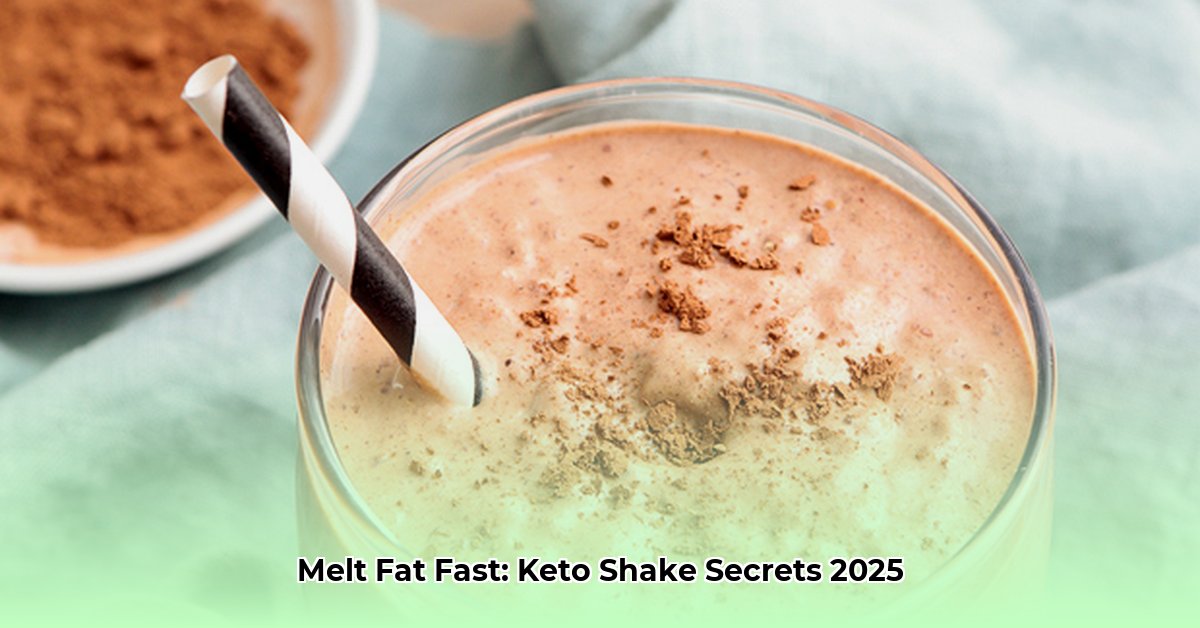
Losing weight on a ketogenic diet can be challenging. Keto meal replacement shakes offer a convenient way to manage your macronutrients, but choosing the right one requires careful consideration. This guide reviews key factors to help you select a shake that aligns with your weight loss goals and health needs.
Understanding Keto Shake Macronutrients: The Key to Success
The ketogenic diet emphasizes a high-fat, moderate-protein, and very-low-carbohydrate intake to induce ketosis (a metabolic state where your body burns fat for energy). Your keto shake should reflect this balance.
The ideal keto shake prioritizes healthy fats (70-80% of calories), moderate protein (15-30 grams depending on your caloric needs) for satiety and muscle preservation, and minimal net carbs (under 5 grams) to maintain ketosis. Why is this ratio so important? Because it's the foundation for effective and sustainable weight loss on a ketogenic diet.
Macronutrient Breakdown: What to Look For and Avoid
| Shake Feature | Ideal Range | What to Look For | What to Avoid |
|---|---|---|---|
| Fat (%) | 70-80% | MCT oil, coconut oil, avocado oil, olive oil | Soybean oil, corn oil, cottonseed oil |
| Protein (grams) | 15-30g (depending on calorie needs) | Whey, casein, soy, pea, brown rice protein | Low-quality, incomplete protein sources |
| Net Carbs (grams) | <5g | Minimal added sugars, minimal sugar alcohols (erythritol preferred if any) | Excessive sugar alcohols (maltitol, xylitol), added sugars |
Deciphering the Ingredient List: Quality Over Quantity
The ingredient list is crucial. It reveals the quality and potential impact on your health and weight loss efforts.
Healthy Fats: Opt for MCT oil (medium-chain triglycerides), coconut oil, avocado oil, and olive oil. These provide quick energy and satiety. Avoid unhealthy fats like soybean oil or corn oil.
Sweeteners: Stevia and monk fruit are generally keto-friendly artificial sweeteners. However, individual tolerances vary. Natural sweeteners contain carbs, so use sparingly. Sugar alcohols like erythritol are often used but can cause digestive issues in some individuals. Maltitol and xylitol should be avoided due to their potential for digestive distress.
Additives: Keep the ingredient list simple. Avoid excessive fillers or artificial colors and flavors.
Added Ingredients: Benefits and Considerations
Many keto shakes include additional ingredients. Let's assess their value:
BHB (Beta-hydroxybutyrate) Ketones: While some studies support their potential benefits in promoting ketosis, more research is needed. Their effectiveness varies significantly among individuals.
Collagen: Offers potential benefits for skin and joint health, but it doesn't directly impact weight loss.
Probiotics: Support gut health, aiding digestion and nutrient absorption. A healthy gut microbiome is essential for overall well-being.
Price and Value: Finding the Best Fit for Your Budget
Price per serving varies widely. Don't solely focus on the cheapest option. Consider the quality of ingredients and the overall nutritional profile. A slightly more expensive shake with superior ingredients may be a more cost-effective choice in the long run, ensuring you stick to your ketogenic diet.
Choosing the Right Keto Shake for Optimal Gut Health
The gut plays a crucial role in overall health and nutrient absorption. Choosing a shake with gut health in mind is essential for supporting your weight-loss journey. Prioritize shakes that:
- Minimize artificial sweeteners and sugar alcohols.
- Contain prebiotics or probiotics to support beneficial gut bacteria.
- Employ easily digestible fats, such as MCT oil.
Begin with a small serving size to assess your tolerance and monitor for any digestive discomfort.
Actionable Steps for Selecting Your Keto Shake
- Analyze Macronutrients: Ensure the shake aligns with the ideal ketogenic ratio (high fat, moderate protein, very low carbs).
- Scrutinize the Ingredient List: Prioritize whole-food ingredients and avoid excessive artificial sweeteners, sugar alcohols, and unhealthy fats.
- Evaluate Added Ingredients: Decide if the benefits of added ingredients (BHB, collagen, probiotics) justify the increased cost.
- Compare Prices and Value: Consider the price per serving in relation to the quality of ingredients and the overall nutritional profile.
- Start Small and Listen to Your Body: Begin with a single serving to assess tolerance and monitor for digestive issues. Adjust as needed.
By carefully considering these factors, you can choose a keto meal replacement shake that supports your weight loss goals, enhances your gut health, and aligns with your personal preferences and budget. Remember consistency is key to long-term success.